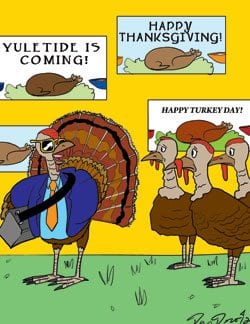
An abundance of thanks
At the first Thanksgiving, the Pilgrims were undoubtedly grateful to have sailed safely across the Atlantic and to have survived the less than hospitable reception by the Native Americans. However, as time went by, a supplicant expression of gratitude developed into a more confident thanks for prosperity in commerce and agriculture.
As yet, most African Americans have been unable to offer effusive thanks for prosperity. The customary prayer is gratitude to have endured another year of racial discrimination with minimal damage. Affluence is still elusive. Yet regardless of the travails and challenges of the preceding year, African Americans continue to remain optimistic.
Researchers have been surprised by the resilience and optimism of black families when compared with whites who have had to endure far less. In October, unemployment for whites was only 6.6 percent compared with 13.8 percent for blacks, a rate twice as high. The average income for a white family in 2009 was $86,276 compared with $53,228 for blacks. And the recession caused a substantial decline in black net worth. In 2010, the median household net worth for whites was 22 times higher than that of blacks.
One might expect that blacks would be discouraged. Not so. Last December the Pew Economic Mobility Project did a study to determine if the American Dream was still alive and well despite the struggling economy. They found that 68 percent of blacks believe their economic circumstances will be better in 10 years, compared with only 48 percent of whites.
Another study by Demos, a national public policy group, affirmed black optimism. They found that only 12 percent of whites (ages 18 to 34) believe they will be better off financially than their parents. A similar group of blacks was three times more confident.
Despite the adverse economic conditions, the election of Barack Obama as president, twice, has had an uplifting impact. It changed the psychological trajectory of many African Americans. One can now see that there is a great day coming. And for that we give thanks.
Preparation is key
Since 1978, minorities have been challenging how police officers are hired and promoted in Boston. Early charges of racial discrimination were originally settled with consent decrees. But now, since large numbers of blacks and Latinos do not succeed on the sergeant and lieutenant promotion exams, a new case has been filed and has been decided recently in the Supreme Judicial Court in favor of minority police officers.
The officers have sued the state’s Human Resources Division that designed the contested exams. There is no allegation that there is any intention to discriminate. According to the law, it is enough if the exams produce a racially discriminatory result. A proposed solution is to develop a procedure that does not depend entirely on a multiple choice exam.
The Massachusetts Association of Minority Law Enforcement Officers (MAMLEO) would do well to establish a program to train minority officers in the skill of taking tests. Otherwise they will still lose points on the multiple choice section of a new exam and fall behind others competing for promotions. That is what happened with the recently revised New Haven Fire Department Promotion Exam.
In order to have a real advantage from their courtroom victory, MAMLEO will have to establish an intensive program to train minority officers to be expert test takers. Otherwise their members could still lose out on the new tests that may be established and found to be non-discriminatory.






